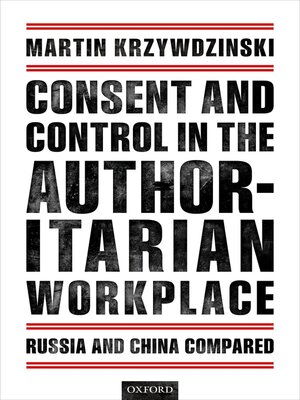Consent and Control in the Authoritarian Workplace
ebook ∣ Russia and China Compared
By Martin Krzywdzinski

Sign up to save your library
With an OverDrive account, you can save your favorite libraries for at-a-glance information about availability. Find out more about OverDrive accounts.
Find this title in Libby, the library reading app by OverDrive.



Search for a digital library with this title
Title found at these libraries:
| Loading... |
Today, a large proportion of the world's states are under authoritarian governments. These countries limit participation rights, both in the political sphere and in the workplace. At the same time, they have to generate consent in the workplace in order to ensure social stability and prevent the escalation of conflicts. But how do companies generate consent given that employee voice and interest representation may be limited or entirely absent? Based on a review of research literature from sociology, organizational psychology, and behavioural economics, this book develops a theory of consent generation and distinguishes three groups of consent-producing mechanisms: socialization, incentive mechanisms, and participation and interest representation. It presents an empirical analysis of how these mechanisms work in Russian and Chinese automotive factories and shows how socio-cultural factors and labour regulation explain the differences
between both countries regarding consent and control in the workplace. The book contributes to two research debates. First, it examines the generation of consent in the workplace-a core topic of the sociology of work and organization. Its particular focus is on consent generation in authoritarian societies. Secondly, the book contributes to the debate about the reasons for the completely different trajectories of post-communist Russia and China. The book provides an empirical analysis that explains the different work behaviours of employees in both countries and
links the micro-level of the workplace and the macro-level of institutions and organizational cultures.






